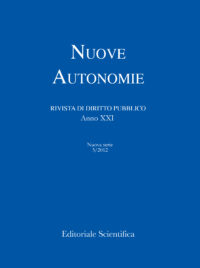
Fascicoli 2/2012
Abstracts
EUROPEAN INTEGRATION AND SOVEREIGNTY FROM A CLASSIC PROBLEM TO THE JUDGEMENT OF THE GERMAN CONSTITUTIONAL COURT OF 12.09.2012
by Dian Schefold
The article discusses, based on the history of sovereignty , the application of this principle on the European Union, with a focus on the development introduced by the Monetary Union. Under this aspect the German constitutional jurisprudence is presented and discussed, from the judgments on the Maastricht and on the Lisbon-Treaty until the last judgments on the financial aids to member States in crisis, finally the judgment on the European Stability Mechanism of 12 September 2012. The article argues in favour of a development of democracy on European level.
THE “OPERATIOIN ADMINISTRATIF” (ADMINISTRATIVE OPERATION) FROM THE PERSPECTIVE OF THE RESULT:
IN THE PROCEEDING AND THE TRIAL
by Loredana Giani
The paper aims to reconstruct the relevance that the concept of the administrative operation can have in the (administrative) proceeding and in the (administrative) trial from the perspective of their effectiveness. After a brief reference to the French and Italian theories that have identified the concept of “administrative operation”, differentiating it from the administrative proceeding, some decisions of the Constitutional Court have been analyzed in order to demonstrate not only that it (the administrative operation) is essential for the effectiveness of administrative action, but also for the joint exercise of different public powers for a common (public) interest. In the second part, attention has been focused on the rules contained in the Code of the Administrative Trial in order to verify in which terms the concept of administrative operation finds its recognition (additional grounds of appeal; lis pendens; related actions; territorial and functional competence).
SCOTLAND ACT, 1998: DEVOLUTION AND ITS IMPACT ON SCOTTISH PRIVATE LAW
by Mario Serio
The essay is aimed at briefly describing the ways in which the relationship between English law and Scottish law has been regulated over the centuries since the Act of Union, 1707 saw the light. In particular, an historical outline of the often re-adfirmed autonomy of Scottish law is here given, with regard to its firm upholding by Scottish Courts in famous cases. The inquiry that is at the heart of the present analysis touches upon the consequences that the passing of the Scotland Act 1998 by the Parliament of Westminster may have had on such autonomy. So, the question is whether or not this law has acted in a way to reinforce, rather than weaken, the idea that Scottish private law continues to be the fundamental body of principles and rules that governs what amounts to an interindividual relationship. An in-depth exploration, conducted in accordance with the main output of the thought of Dicey, of both the few judicial decisions and the wider doctrinal contributions that have developed since the Scotland Act was approved at the end of last millennium leads to the reasoned conclusion that the autonomy has been left intact and this Statute has even propelled the notion that Scottish private law, and its underlying principles, is the prime legal source as regards the field of all relationships falling into Gaius’s traditional partition.
PROCESSES OF MODERNIZATION AND DEVOLUTION FOR THE FRENCH SEA-PORTS
by Roberta Lombardi
This project focuses on the important process of reorganization, which has affected the French port system, through the n. 660/2008 and n. 809/2004 laws. The former has redrawn the governance of the eight “greatest sea ports” (GSP) to increase their competitiveness in comparison to the order European sea ports; this law includes, among other issues, the privatization of the port services and personnel. The latter has resulted in a true process of devolution, as it established that the ownership and management of the ex commercial ports of national importance (PNI) are passed to the local authorities (e.g. departments and regions).
SIMPLIFICATION AND DISTRIBUTION OF LEGISLATIVE POWERS
by Stefano Salvatore Scoca
This paper tends to test the compatibility of administrative simplification with the division of legislative powers based on the criterion of the matter as indicated in the current Title V of the Constitution. It addresses the issue by detecting as many institutes that are part of the so-called administrative simplification, in fact, relate to matters which pertain to the regional legislative authority. In particular, we considered the SCIA, simplification tool, which repeats the pattern of the conflict of legislative powers. In essence, the paper aims to highlight the need for a reform of article 117 of the Constitution, reform seems to have started with the constitutional bill recently approved by the Council of Ministers, which, however, is unsatisfactory.
THE ROLE OF THE PRINCIPLES IN THE FIELD OF PUBLIC CONTRACTS
by Salvatore Dettori
The paper analyzes the principles in the field of public procurement. It examines the nature and role of the principles, the balance between them, the solution of conflict. The author defends the thesis that there can be no conflict between rules and principles, but only between principles and shows how judges decide the conflict in the decisions on cases.
THE PRODUCTION OF RENEWABLE ENERGY IN PORT AREAS, PARTCULARY WITH REGARD TO WAVE ENERGY
by Sara Forasassi
The paper examines legal institute about renewable wave energy production in a port. Today, this source of energy is studies a lot, but there are some problems in regard to building costs of this system, necessary for collect sea energy. However, in Italy, some prototype are just built in a port. The employment of this energy source in a port, is crucial from a sustainable development point of view.
